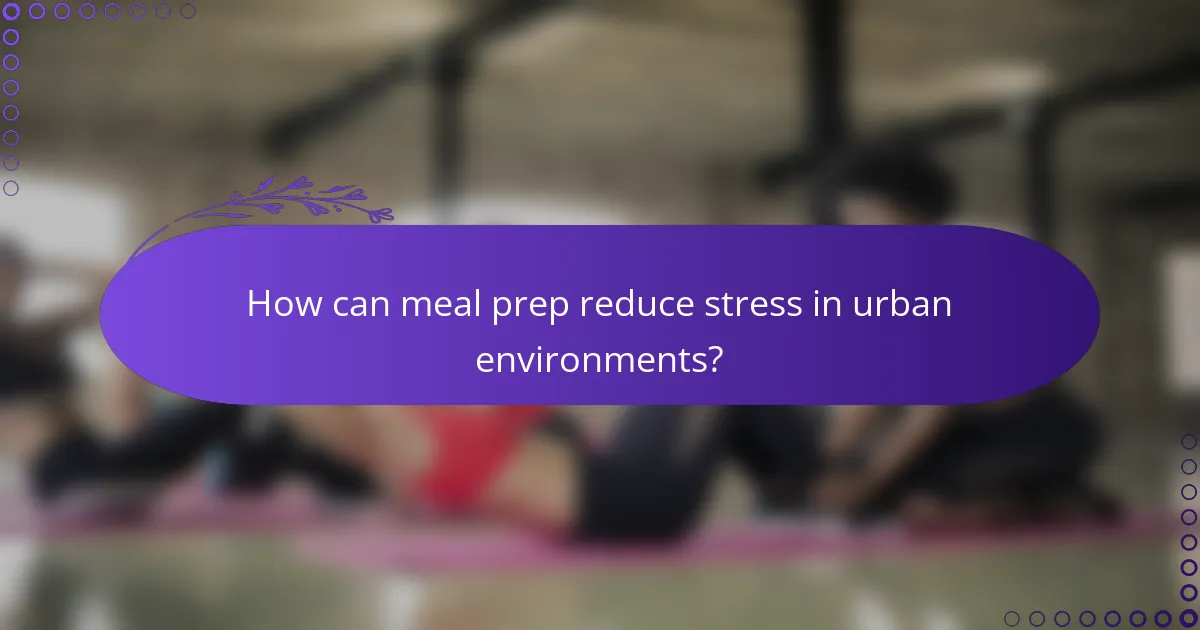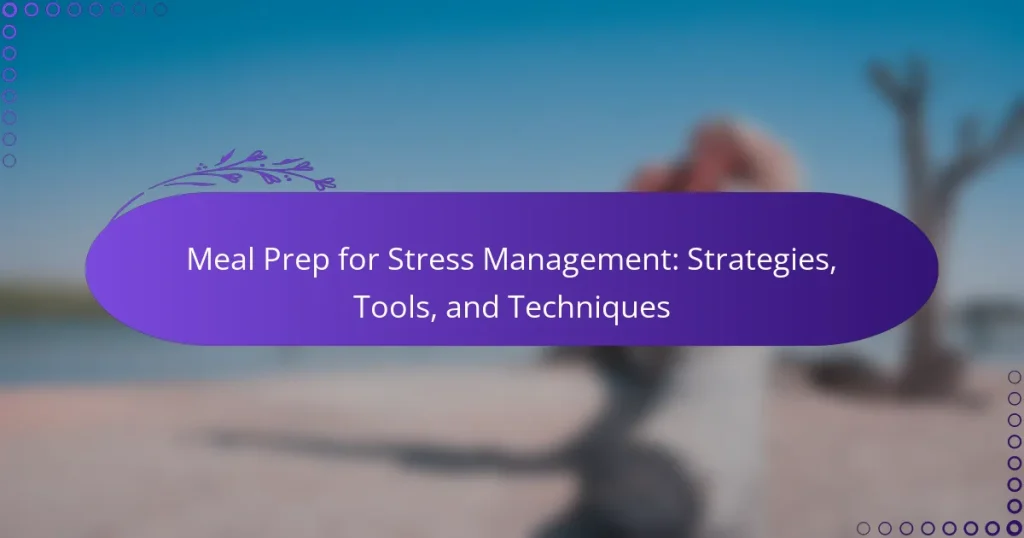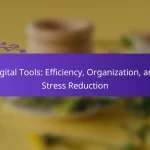Meal prep is a powerful strategy for managing stress, particularly in fast-paced urban environments, by simplifying the cooking process and ensuring access to nutritious meals. By planning meals in advance and utilizing efficient tools, individuals can alleviate daily pressures and foster healthier eating habits, ultimately contributing to a more balanced lifestyle.

How can meal prep reduce stress in urban environments?
Meal prep can significantly reduce stress in urban environments by streamlining the cooking process and ensuring access to healthy meals. This proactive approach helps busy individuals manage their time and nutrition more effectively, leading to a more balanced lifestyle.
Improved time management
Meal prep allows individuals to allocate specific times for cooking, which can lead to better overall time management. By preparing meals in advance, you can minimize the daily time spent on cooking, giving you more freedom for other activities.
Consider dedicating a few hours on weekends to prepare meals for the week ahead. This can involve batch cooking grains, proteins, and vegetables, which can then be easily assembled into various dishes throughout the week.
Enhanced nutritional balance
Planning meals in advance helps ensure a balanced diet by allowing you to incorporate a variety of food groups. This can lead to better overall health and well-being, which is crucial for managing stress levels.
When meal prepping, aim for meals that include lean proteins, whole grains, healthy fats, and plenty of fruits and vegetables. This not only supports physical health but also contributes to mental clarity and emotional stability.
Reduced decision fatigue
Meal prep reduces decision fatigue by eliminating the need to decide what to eat every day. With pre-planned meals, you can avoid the stress of last-minute choices that often lead to unhealthy eating habits.
To further simplify your choices, create a rotating meal plan that includes a few go-to recipes. This way, you can enjoy variety without overwhelming yourself with options every week.

What are effective meal prep strategies for stress management?
Effective meal prep strategies for stress management include planning meals in advance, cooking in bulk, and using versatile ingredients. These approaches help reduce the daily pressure of cooking and ensure healthier eating habits, which can alleviate stress.
Batch cooking
Batch cooking involves preparing large quantities of meals at once, which can save time and reduce the need for daily cooking. This strategy allows you to create a variety of dishes that can be stored and reheated throughout the week, minimizing the stress of last-minute meal decisions.
To implement batch cooking, choose a day to cook multiple meals, such as Sunday. Focus on recipes that store well, like soups, stews, or casseroles. Divide the meals into portions and store them in the refrigerator or freezer for easy access during busy days.
Portion control
Portion control is crucial for managing both stress and nutrition. By pre-portioning meals, you can avoid overeating and ensure balanced nutrition, which contributes to overall well-being. This method also simplifies meal choices, reducing the mental load of deciding how much to eat.
Use containers that are appropriately sized for single servings, and consider using a food scale or measuring cups to help with accuracy. Aim for balanced portions that include proteins, carbohydrates, and vegetables, which can help maintain energy levels and mood stability.
Ingredient versatility
Ingredient versatility refers to using a core set of ingredients that can be transformed into various meals. This strategy not only simplifies shopping and cooking but also allows for creativity in meal preparation, reducing the monotony of eating the same foods.
Choose ingredients that can be used in multiple ways, such as chicken, quinoa, and seasonal vegetables. For example, grilled chicken can be served with a salad, used in wraps, or added to stir-fries. This flexibility helps keep meals interesting while minimizing the stress of planning diverse menus.

Which tools enhance meal prep efficiency?
Several tools can significantly boost the efficiency of meal prep, making it easier to manage time and resources. Key items include meal prep containers, food processors, and slow cookers, each serving a distinct purpose in streamlining the cooking process.
Meal prep containers
Meal prep containers are essential for organizing and storing pre-cooked meals. Look for containers that are microwave-safe, dishwasher-friendly, and made from BPA-free materials to ensure safety and convenience.
Consider using a variety of sizes to accommodate different meal portions. Stackable designs can save space in your fridge or freezer, making it easier to access your meals when needed.
Food processors
A food processor can drastically reduce the time spent on chopping, slicing, and dicing ingredients. This versatile tool can handle a range of tasks, from making sauces to shredding vegetables, allowing for quicker meal preparation.
When choosing a food processor, look for models with multiple attachments and varying bowl sizes. A capacity of 8-14 cups is typically sufficient for most home cooks, enabling you to prepare larger batches efficiently.
Slow cookers
Slow cookers are perfect for preparing meals with minimal hands-on time. Simply add your ingredients in the morning, set the timer, and return to a fully cooked meal by dinner, making them ideal for busy schedules.
When using a slow cooker, consider recipes that require longer cooking times, such as stews or soups. A programmable model can offer added convenience, allowing you to adjust cooking times and temperatures based on your needs.

What are the best meal prep services available?
Several meal prep services stand out for their convenience, variety, and quality, making them ideal for stress management. These services provide pre-portioned ingredients and ready-to-eat meals, helping you save time and reduce the mental load of planning meals.
Freshly
Freshly offers a selection of chef-cooked meals that are delivered fresh, not frozen. Each meal is designed to be ready in just a few minutes, making it a great option for busy individuals. With a rotating menu that includes various dietary options, you can easily find meals that fit your preferences.
Consider the subscription plans, which typically range from four to twelve meals per week, allowing flexibility based on your needs. Freshly meals are generally priced around $8 to $12 each, depending on the plan you choose.
Snap Kitchen
Snap Kitchen focuses on healthy, balanced meals made from fresh ingredients. Their offerings include a variety of options, such as salads, bowls, and snacks, catering to different dietary needs like gluten-free and vegetarian. Meals are available for pickup or delivery, depending on your location.
Pricing for Snap Kitchen meals usually falls between $9 and $13 each, with the option to purchase individual meals or meal bundles. This service is particularly useful for those looking to maintain a healthy diet without the hassle of cooking.
Trifecta
Trifecta specializes in organic, sustainably sourced meals that cater to health-conscious consumers. They offer a range of meal plans, including paleo, keto, and vegan options, ensuring there’s something for everyone. Meals are delivered fresh and can be heated in minutes.
Trifecta’s pricing typically ranges from $10 to $15 per meal, depending on the specific plan and ingredients. This service is ideal for those who prioritize organic food and are willing to invest a bit more for quality and sustainability.

How to choose the right meal prep plan for stress relief?
Selecting the right meal prep plan for stress relief involves understanding your dietary needs, budget, and available time. A well-structured plan can help reduce anxiety around meals and promote healthier eating habits.
Assess dietary preferences
Start by identifying your dietary preferences, such as vegetarian, vegan, gluten-free, or specific nutritional goals like high-protein or low-carb. This ensures that the meals you prepare align with what you enjoy and can sustain over time.
Consider creating a list of your favorite meals and ingredients. This can guide your meal prep choices and make the process more enjoyable, ultimately reducing stress associated with food decisions.
Evaluate budget constraints
Understanding your budget is crucial when choosing a meal prep plan. Determine how much you can allocate for groceries each week, keeping in mind that meal prepping can often save money compared to eating out.
Look for seasonal produce and bulk items to maximize your budget. Planning meals around sales or discounts can also help you stay within your financial limits while still preparing nutritious meals.
Consider time availability
Assess how much time you can realistically dedicate to meal prep each week. If you have a busy schedule, opt for simpler recipes that require minimal cooking time or can be made in larger batches for multiple meals.
Creating a meal prep schedule can help you stay organized. For instance, setting aside a few hours on the weekend to prepare meals for the week can significantly reduce daily cooking stress.

What are common challenges in meal prepping?
Meal prepping can present several challenges that may hinder its effectiveness and sustainability. Common issues include time constraints, ingredient spoilage, and lack of motivation, each requiring specific strategies to overcome.
Time constraints
Time constraints are a significant barrier to effective meal prepping. Many individuals struggle to find sufficient time to plan, shop for, and prepare meals, especially during busy workweeks. To manage this, consider dedicating a specific day, like Sunday, for meal prep, allowing for focused time to cook and store meals for the week ahead.
Batch cooking can also save time. Preparing larger quantities of staples like grains, proteins, and vegetables can streamline the process, enabling you to mix and match components throughout the week. Aim for 2-3 hours of prep time to cover multiple meals, which can significantly reduce daily cooking time.
Ingredient spoilage
Ingredient spoilage is another common challenge in meal prepping, leading to wasted food and money. Fresh produce, in particular, can spoil quickly if not stored properly. To mitigate this, prioritize ingredients with longer shelf lives, such as root vegetables, frozen fruits and vegetables, and canned goods.
Additionally, consider using airtight containers to store prepped meals, which can extend freshness. A good rule of thumb is to consume prepared meals within 3-5 days to ensure quality and safety. Regularly check your pantry and fridge to use older items first, reducing the risk of spoilage.
Lack of motivation
Lack of motivation can derail even the best meal prep plans. When the initial excitement fades, it can be easy to revert to takeout or convenience foods. To maintain motivation, set realistic goals and celebrate small victories, such as successfully prepping a week’s worth of lunches.
Incorporating variety into your meal prep can also help sustain interest. Experiment with new recipes or themes, like “Meatless Mondays” or “Taco Tuesdays,” to keep meals exciting. Joining a meal prep group or sharing your progress on social media can provide additional encouragement and accountability.


